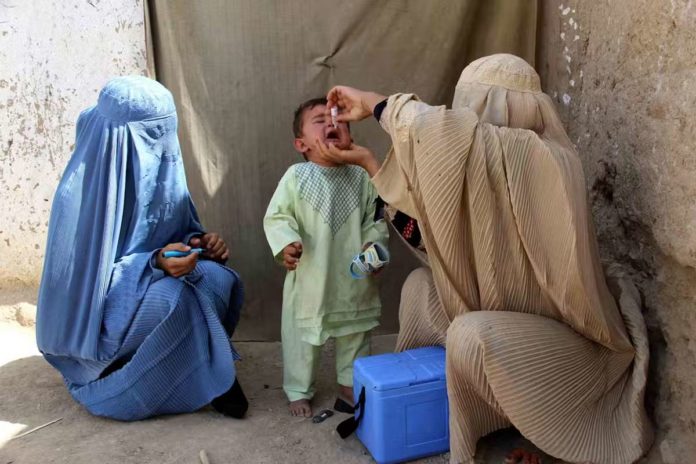Afghanistan, one of two countries where the polio virus still exists, faces a significant health crisis due to a ban on door-to-door vaccinations. Restrictions on women’s mobility not only limit access to education but also severely hinder healthcare, placing children at heightened risk.
Polio has been eradicated worldwide, except for Afghanistan and Pakistan, which remain the only countries where polio is endemic. Poliovirus is a highly infectious disease that can cause lifelong paralysis and even death, especially in infants and young children. While Pakistan’s polio program has seen increased coverage despite ongoing challenges, Afghanistan, under Taliban control, continues to resist effective vaccination efforts.
In 2024, the World Health Organization (WHO) reported 18 new polio cases in Afghanistan, a significant increase from 2023. Local health workers believe this number may be higher, as many cases go undetected due to the ban on polio vaccination campaigns. Additionally, the deportation of tens of thousands of Afghan refugees has increased the risk of spreading polio. The Global Polio Eradication Initiative (GPEI) reported a 121% increase in polio cases in Afghanistan between 2023 and 2024. In the same period, 30,500 children in eastern Afghanistan and 36,700 in the south missed their vaccinations.
Why Does Polio Persist in Afghanistan?
Two main reasons explain the persistence of polio in Afghanistan: security concerns of the Taliban and the exclusion of women from administering vaccines.
Taliban’s Resistance to Polio Vaccination
In 2019, the Taliban banned polio vaccinations in areas under their control but later lifted the ban partially under international pressure. In early 2024, the Taliban allowed door-to-door vaccinations for the first time in five years, following recommendations from the WHO. However, in southern Kandahar, they adopted a mosque-to-mosque vaccination strategy, which proved far less effective, leaving many children unvaccinated. Despite this partial lift, the Taliban once again suspended the vaccination campaigns.
The Taliban distrust door-to-door campaigns, fearing they may raise concerns among families. In the past, such campaigns were used by U.S. intelligence agencies to track targets, deepening the Taliban’s suspicions of Western-backed health initiatives. Consequently, the Taliban favor mosque-based vaccination efforts, expecting parents to voluntarily bring their children.
Women’s Role in Vaccination
The Taliban have imposed significant restrictions on the movement and employment of women, which has further impeded polio eradication efforts. An Afghan health official told The Guardian:
“The postponing of the polio campaign is due to issues with the modality of implementation. The current leadership has ordered us not to conduct door-to-door campaigns. This is bad news for the polio program. To eradicate polio, we need to vaccinate more than 95% of children with two doses. Without door-to-door campaigns, we won’t reach that target, and it puts the whole country, even the region, at risk.”
Women often serve as primary caregivers and are key to the success of vaccination campaigns. In many Afghan communities, only female health workers can access households, as it is more socially acceptable to receive certain information and services, including vaccination, from women. Female health workers also provide essential services such as health education, antenatal care, and routine immunizations. By restricting their involvement, the Taliban’s policies have significantly undermined vaccination efforts.
Recommendations
- Integrate Women into the Polio Program: Women’s participation is crucial. Female health workers in supervisory positions can strengthen the program and improve its effectiveness.
- Adopt a House-to-House Approach: Afghanistan should fully implement house-to-house vaccination across the country. The leadership of Afghanistan’s Polio Program should partner with UNICEF and civil society organizations to better understand local concerns regarding polio vaccines.
- Utilize New Detection Techniques: Using modern techniques for detecting polio and sequencing the virus can help identify outbreaks more quickly, speeding up vaccination efforts and improving success rates.
- Foster Public Ownership: Public trust in vaccination teams is essential for eradicating polio. Families need to welcome these teams into their homes to ensure widespread vaccination.
- Leverage Local Insights: Incorporating the insights of local health teams in policy decisions is key to shaping effective vaccination strategies. Local knowledge of communities can greatly enhance outreach efforts.
Conclusion:
Polio’s persistence in Afghanistan threatens not just the country but the region as a whole, with the potential for cross-border outbreaks. Immediate global action is needed to prevent this health crisis from escalating. The Taliban’s ban on crucial vaccination campaigns risks reversing decades of progress, leaving millions of children at the mercy of a preventable disease. By restricting access to life-saving vaccines, Afghanistan is edging closer to a public health disaster. Lifting these bans and allowing full vaccination coverage is the only way forward. The world cannot afford complacency—every unvaccinated child is another step backward in the fight against polio.




